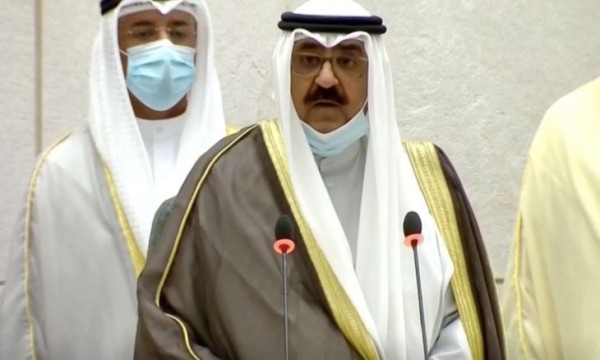Kuwait's Emir Tasks Crown Prince with Naming PM

2021-11-17 - 6:59 am
Bahrain Mirror- Reuters: Kuwait's emir has temporarily handed over to its crown prince, his designated successor, some of his main constitutional duties including naming the prime minister, swearing in the cabinet and issuing laws, according to a decree issued on Tuesday.
Emir Sheikh Nawaf al-Ahmed al-Sabah, who looked frail in his last public appearance in late October, had on Monday asked his half brother Crown Prince Sheikh Meshal al-Ahmad al-Sabah to assume some of his duties. Both are in their 80s.
Sheikh Nawaf earlier this week accepted the government's resignation but had not yet named a prime minister to form a new cabinet, which would be the OPEC member state's third this year amidst a standoff between the government and elected parliament.
The emir, who assumed power in U.S.-allied Kuwait in September 2020 after the death of his brother, who had ruled for over a decade, had acted to end the feud by pardoning dissidents in an amnesty sought by opposition lawmakers.
Several opposition MPs had also insisted on questioning Prime Minister Sheikh Sabah al-Khalid al-Sabah over issues including handling of the coronavirus pandemic and corruption despite a March motion granting him temporary immunity.
The row has hindered state efforts to carry out fiscal reform, including enacting a debt law needed to tap global markets.
The crown prince was also granted authority to issue emiri decrees, appoint military personnel and diplomats and to enter into international treaties, according to the decree.
"What was handed over (to the crown prince) were the competencies required at this time," Kuwaiti constitutional expert Mohammad Al Moqatei told Reuters.
"There are other important competencies that were not handed over, such as the direct right to dissolve parliament and propose and approve constitutional amendments."
Frequent political deadlock in Kuwait has for decades caused cabinet reshuffles and dissolutions of parliament, which wields more power than similar bodies in other Gulf monarchies, including to pass and block laws, question ministers and submit no-confidence votes against senior government officials.
The political instability has hindered reform and investment.
- 2022-07-07Israel Reaches Record Trade Increase With Arab States Under Abraham Accords
- 2022-06-10Israeli PM Bennett Visits Abu Dhabi, Meets with UAE President
- 2022-06-10Israelis to be Allowed into Qatar for World Cup, Officials Say
- 2022-06-06Biden should not Visit Saudi, Meet Crown Prince: US Lawmaker Adam Schiff
- 2022-06-01Israel Signs UAE Free Trade Deal, Its First in Arab World